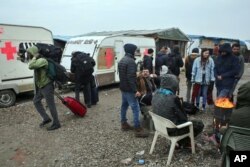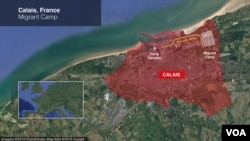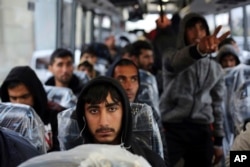Bundled up in jackets and surrounded by suitcases, migrants from Calais’ sprawling "Jungle" migrant camp lined up in the pre-dawn chill Monday for the next step in their European odyssey.
By mid-morning the first busload of mostly Sudanese migrants were bound for Burgundy, some shouting "Bye, bye Jungle,” as their bus drove out of France’s largest slum. French Interior Minister Bernard Cazeneuve said that 2,318 migrants had been evacuated from the camp by day's end.
The evacuation in the northern port city is "for the moment taking place calmly and is under control,” said French Interior Minister Bernard Cazeneuve, who has described the operation as a “humanitarian duty.”
During the coming week, authorities hope to empty the Jungle, dispatching most of its roughly 6,000-8,000 residents to temporary shelters around the country. As of Tuesday, workers will begin dismantling the wood-and-tarp shanty town that has become symbolic of Europe’s larger migrant crisis.
Yet the government’s plan for dealing with the migrants is proving controversial, dividing towns, charities and the migrants themselves.
Long term solution sought
“We witnessed the dismantlement of Sangatte in 2002, and tent camps sprung up after because it wasn’t a solution,” Yannick le Bihan, operations director for French charity Medicins du Monde (Doctors of the World), of a previous migrant camp in the area.
Without a long-term plan and a concerted European response to the migrant crisis, he said, “... we’ll face the same problem again.”
That sentiment is shared by some Calais residents.
“We’ve had this migrant problem for 20 years here,” said one Calais taxi driver, giving only his first name, Christophe. “Nothing has been resolved.
Hailing from Afghanistan, Ethiopia, Eritrea or Iraq, many Jungle residents have remained in the squalid camp for months, after making perilous journeys by land or sea from their homelands. Many hoped to reach Britain, just across the Channel from Calais, where they have family or simply believe they may have a better future.
Now, they will be relocated to towns as far as southern France, housed in shelters equipped with toilets and heating, luxuries after months in the Jungle’s mud and cold. Those who choose can apply for asylum in France. If they fail to qualify or choose not to apply, they will be deported, officials say.
The hundreds of unaccompanied children living in the Jungle pose another problem. Britain has welcomed some of them, but charities fear for the safety of those remaining.
Britain further away
Even their short-term fate is uncertain, le Bihan said, with “authorities sending them from one area to another” at the start of the evacuation on Monday.
As the day wore on, Jungle residents hugged each other as they bid goodbye. Colored bands on their wrists attested to their ultimate location. They were given the choice of two places to settle around the country.
“I’m happy to stay in France, it’s a good country,” a young man sporting a blue wristband told French TV.
Others expressed concern about the camp’s dismantlement. A local charity, Auberges des Migrants, estimated up to 2,000 residents do not want to leave the Calais area, still hoping to hijack rides by ferry or truck to Britain.
Sentiments are equally fractured in towns expected to host the migrants. In the Loire village of Saint-Denis-de-Cabanne, residents staged rival demonstrations for and against the newcomers in recent weeks.
“These migrants are fighters. All of them, or almost all are here to wage Jihad,” one resident told France’s Liberation newspaper.
“Dispatching the Calais problem elsewhere in France is not the solution,” says Rudy Vercuque, a Calais-based regional councilor for the far-right National Front party, which has been urging mayors around the country to resist taking in migrants. “It will just create the same problem somewhere else.”
But the western village of Naintre has offered a different response. Local officials took in 25 Afghans and Sudanese from the Jungle, weeks before the camp’s dismantlement, and despite some local resistance.
“We wanted to help them, they’re humans,” Naintre’s mayor Christine Piaulet told French radio. “And too bad if we’re not reelected in 2020.”
WATCH: Migrants arrive in Sicily









